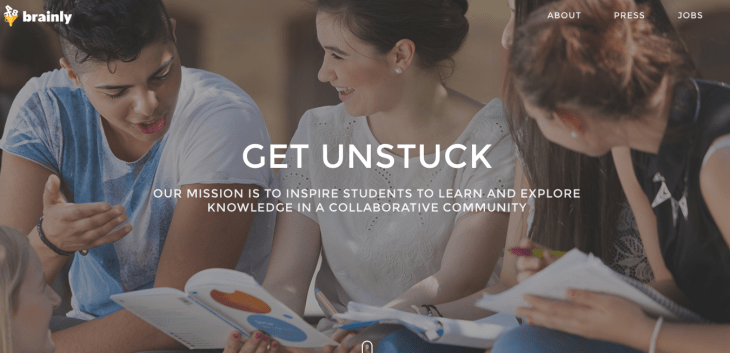Polish startup Brainly has come a long way since it raised a $500,000 seed round back in 2012. Then the company, which operates a ‘social learning network’ for students to help each other with schoolwork, boasted 7 million users per month, across 17 localised sites, who had answered 2 million questions in total.
Fast forward to today, and Brainly now spans 35 countries throughout Europe, South America, and Asia, and is doing 30 million visitors per month, with a total of 8 million questions answered. And if that doesn’t have your attention, 8,000 questions are posted per hour across Brainly’s properties. Kids wanting to learn have never had it so easy.
All of this traction, and a refreshingly localised strategy not untypical for the more ambitious of European startups, doesn’t appear to have gone unnoticed by the U.S. VC community either. Today Brainly is disclosing a $9 million Series A round led by General Catalyst Partners, with participation from a number of other previous and new investors, including Europe’s Point Nine Capital, and Runa Capital. Money it plans to use to expand operations and market share States-side — where it already claims 500,000 monthly users — including the opening of an office in New York City and recruiting a U.S. executive team.
“We found U.S. VCs to be really receptive to our global traction,” Brainly CEO Michal Borkowski tells me when I ask him about the challenge European startups sometimes face when seeking funding in Silicon Valley. “One of our unique things as a startup is that we came into the U.S. already proving global relevance to the problem. We see the U.S. as an absolutely critical market and when we met GC it was a great partnership with their focus on education.”
Furthermore, if there’s one lesson to share, he says, it’s making sure you have a great product that provides a solution to a universal problem. “This leads to partners which will help a company grow,” adds Borkowski.
But, despite its distinctly Eastern European roots — Russia/Eastern Europe remains the top performing markets — in one respect at least, Brainly resembles a typical Silicon Valley play. The company is yet to monetise its social learning network/Q&A site. Instead, reaching scale remains the focus for now.
That’s not to say, however, that Borkowski and his team don’t have ideas around how they eventually plan to generate revenue. “We have an awesome opportunity because we capture kids’ attention at the optimum moment when they want to learn,” he says. “Students come to Brainly when they both want and need to learn. We call this the ‘stuck” moment, and we see huge power in it.”
How that ‘stuck’ moment can be monetised, Borkowski isn’t quite ready to say, but hints that a freemium model of some kind will be the preferred option. “Our vision is to ultimately maximize the potential of this moment to inspire students to learn in a collaborative community. Ultimately we are confident we can monetize in a variety of ways typically seen in freemium businesses, from advertising to upselling products or features. We have done some early testing, but it is not a focus for the next 12 months at least.”
